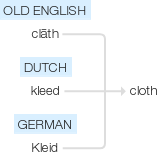Cloth
Old English clāth, related to Dutch kleed and German Kleid, of unknown ultimate origin.
wiktionary
From Middle English cloth, clath, from Old English clāþ(“cloth, clothes, covering, sail”), from Proto-Germanic *klaiþą(“garment”), from Proto-Indo-European *gleyt-(“to cling to, cleave, stick”). Cognate with Scots clath(“cloth”), North Frisian klaid(“dress, garment”), Saterland Frisian Klood(“dress, apparel”), West Frisian kleed(“cloth, article of clothing”), Dutch kleed(“robe, dress”), Low German kleed(“dress, garment”), German Kleid(“gown, dress”), Danish klæde(“cloth, dress”), Norwegian klede, Swedish kläde(“cloth”), Icelandic klæði(“cloth, dressing”), Old English clīþan(“to adhere, stick”). Compare Albanian ngjit(“to stick, attach, glue”).
etymonline
cloth (n.)
"woven fabric, pliable stuff made of intertexture of threads or fibers," Old English claþ "a cloth, sail, cloth covering, woven or felted material to wrap around one," hence, also, "garment," from Proto-Germanic *kalithaz (source also of Old Frisian klath "cloth," Middle Dutch cleet, Dutch kleed "garment, dress," Middle High German kleit, German Kleid "garment"), which is of obscure origin, perhaps a substratum word.
As an adjective, "made or consisting of cloth," from 1590s. Meaning "distinctive clothing worn by some group" (servants of one house, men of some profession or trade) is from 1590s, hence The cloth "the clerical profession" (1701).
